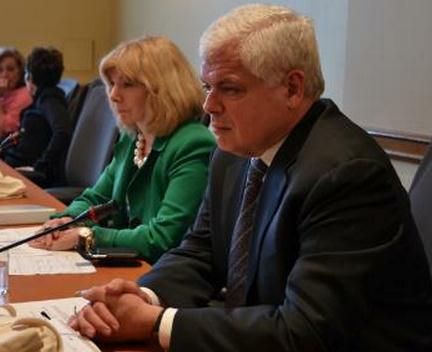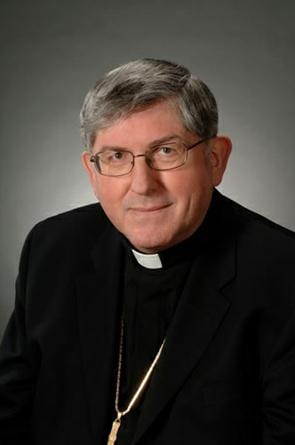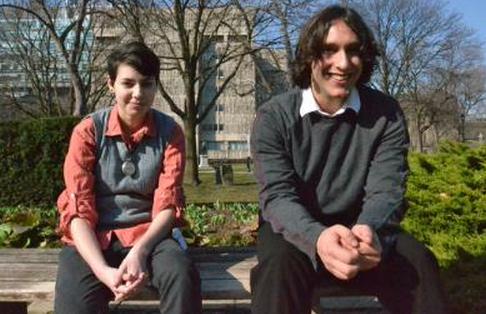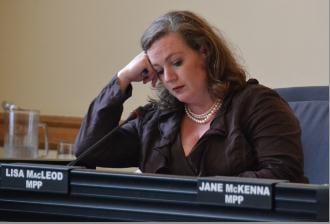
NDP MPPs Cheri DiNovo and Peter Tabuns listen to presentations during day two of committee hearings for Bill 13 and Bill 14 at Queen's Park May 8. Credit: Andrea Houston

Cardinal Thomas Collins, archbishop of Toronto. Credit: Courtesy photo

Mississauga Catholic students and GSA activists Leanne Iskander and Christopher Mckerracher. Credit: Andrea Houston
UPDATE: June 4 – The third and final reading of Bill 13, the Liberals’ Accepting Schools Act, begins today, June 4, at Queen’s Park.
The amended version of the bill will be debated in the Ontario legislature sometime after 1:30pm.
NDP MPP Peter Tabuns says the final vote will likely take place after Question Period on June 5.
Scroll down for a copy of the final draft of Bill 13.
Ontario anti-bullying bill moves to final vote
The Ontario Liberal government’s Accepting Schools Act has passed the committee stage and is now moving to a third and final vote at Queen’s Park.
The bill was recently amended to ensure that schools in the province, including Catholic schools, must allow students the option of choosing the name gay-straight alliance (GSA) for support groups.
For the past month, the standing committee for social policy has been looking at two anti-bullying bills, Bill 13 and the Progressive Conservative’s Bill 14. During two days of clause-by-clause reading of Bill 13 on May 28 and 29, PC education critic Lisa MacLeod became visibly upset when several of her motions to include portions of Bill 14 were defeated. She says Bill 13 has sent a “chill” through religious communities.
“A lot of people came here to committee and told us what they’re looking for,” she says, referring to several religious representatives and parents, including some that claimed Bill 13 is a “radical sex education agenda” that promotes “the gay lifestyle.”
As NDP and Liberal amendments were submitted, both PC committee members, MacLeod and MPP Jane McKenna, abstained from motions, such as the Liberals’ amendment to allow GSAs to be named by students and an NDP amendment to include “transphobia and biphobia” wherever “homophobia is mentioned.”
MacLeod says she was particularly frustrated that Bill 14’s reporting mechanisms to track bullying statistics did not make it into the final bill.
But Casey Oraa, vice-chair of Queer Ontario, says MacLeod is wrong. “The compliance and accountability amendments we put forward took elements of Bill 14,” he says.
The PCs also voted against the final Bill 13. MacLeod says it will allow too much government intervention in schools.
“Look, I’m a Conservative. At the end of the day we need less government, not more. This bill reeks of that at this level,” she says. “We think kids and the school community should work together. We don’t believe any kind of clubs should be legislated.”
MacLeod also raised concerns on May 29 that Bill 13 would infringe on the rights of religious groups, which in some cases use schools as houses of worship on the weekends.
NDP MPP Peter Tabuns calls this a “red herring.” Bill 13 will not supersede the Charter of Rights and Freedoms, he says. “Some groups expressed fear that their worship services could be blocked if there was an expression of homophobia, but that’s not the case.”
NDP MPP Cheri DiNovo says she was “disgusted” by the testimony of some groups and takes offence at those who claimed to speak for all religious people. “They assumed that every religious group that rents a school will go into a homophobic rant as soon as they stand in front of the congregation.”
After the final vote sending the bill to third reading, many Liberal and the NDP MPPs were beaming.
“I’m really happy,” Tabuns says. “There’s more that needs to be done to tackle bullying, but this is putting some really great stuff in place that many gay youth across Ontario will benefit from. Across Canada they will look at Ontario and say, ‘If they can do it there, why can’t we protect our gay young people here?’ Young people will be able to set up groups, call them GSAs, build the alliances and friendships they are going to need to create safe schools.”
Mississauga Catholic student Leanne Iskander, whose demand for a GSA at her school in March 2011 sparked a provincewide student movement, was thrilled that Bill 13 is in the home stretch.
“It means schools won’t be able to censor our identity anymore,” she says. “It also means new Grade 9 students will be able to find the club because the name is recognizable. We may even choose a more inclusive name, because GSA is not trans-inclusive.”
But Iskander says she questions whether Catholic schools will comply with the law, and she wonders who will police the boards?
“If schools continue to deny student groups, I hope students in those schools make their voices heard,” she says. “If students are blocked by their schools they will have to take legal action. They shouldn’t ask high school students to take their boards to court because their schools aren’t accepting. That’s a problem because many students aren’t out yet.”
On May 28, Cardinal Thomas Collins, the archbishop of Toronto, held a press conference to announce that the Ontario government has launched an attack on “religious freedom” by supporting GSAs. He said students should not have the power to name their clubs.
However, the press conference was not announced to the Queen’s Park press gallery and Collins did not invite all media. He did not respond to Xtra’s requests for comment.
Collins released a statement: “I question, however, why provincial legislation should make this particular method normative in a Catholic school, which has its own different but effective methods of attaining the goal of addressing bullying and providing personal support for all students, ones which, unlike GSAs, arise out of its own fundamental principles and are in harmony with them. If the point is that there is something unacceptable about those Catholic principles, then I find that troubling, and wonder whether caricatures of Catholic faith are in play.”
Collins told reporters he wonders “why a piece of provincial legislation is being used to micromanage the naming of student clubs” and “why Catholics are not free to design their own methods to fight bullying?”
Iskander also wonders what GSAs will look like in Catholic schools and how much administration will interfere. She says the Pastoral Guidelines to Assist Students of Same-Sex Orientation, the primary document used by Catholic educators to council queer youth, should be scrapped. The document states that schools should teach that homosexuality is “intrinsically disordered” and “of grave depravity.”
“It’s very important that the clubs are student-run and they shouldn’t be told homophobic doctrine,” she says. “There is still work to be done around the content of groups. They should get rid of the Pastoral Guidelines. It shouldn’t be in a publicly funded school.”
In the National Post, Ontario Catholic School Trustees Association (OCSTA) president Marino Gazzola admits groups “will follow Catholic teaching.”
“We want them to have a respect for the Catholic teachings that GSAs do not have as far as we’re concerned,” Gazzola says.
In a media conference call, which Xtra was not invited to, Gazzola called the word gay “a distraction” and said anti-bullying legislation is supposed to protect all students, not just those who are bullied because of their sexual orientation.
Meanwhile, the Ontario English Catholic Teachers’ Association (OECTA) on May 29 released a statement of support for both GSAs and the amendment to Bill 13, which would mandate them.
On May 29, Premier Dalton McGuinty shot back at Collins and Gazzola, telling reporters that the provincial government is in charge of running Ontario schools, not the Catholic Church. “I’m accountable to all faiths. I’m accountable to people of no faith. I’m accountable to all parents.”
While he applauds McGuinty’s statements, Queer Ontario’s Oraa says he will remain “cautiously optimistic” until Bill 13 passes third reading, which he says will likely be in early June before the legislature rises for the summer.
“I’m confident it will pass because there is increasing public support and awareness for this issue,” he says. “There are already polls that show there is not a lot of support for the separate Catholic school system in Ontario, and Ontarians overwhelmingly support students’ rights to GSAs in Catholic schools. What [Collins and Gazzola] say is thinly veiled homophobia.”
Tabuns says the Catholic community will likely have many internal discussions this summer as the bill moves toward implementation in schools.
“It’s not entirely clear to me at this point. The Catholic community is very broad and very diverse. Catholic teachers have been strongly supportive of GSAs,” he says. “The world is moving on. They have to face that and accommodate to that.

 Why you can trust Xtra
Why you can trust Xtra


